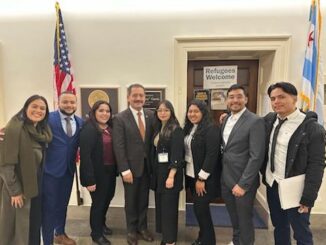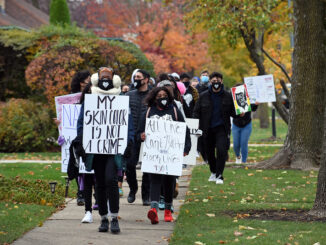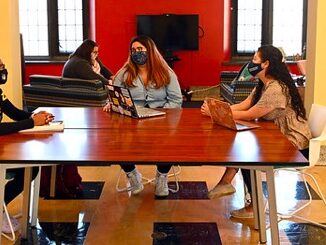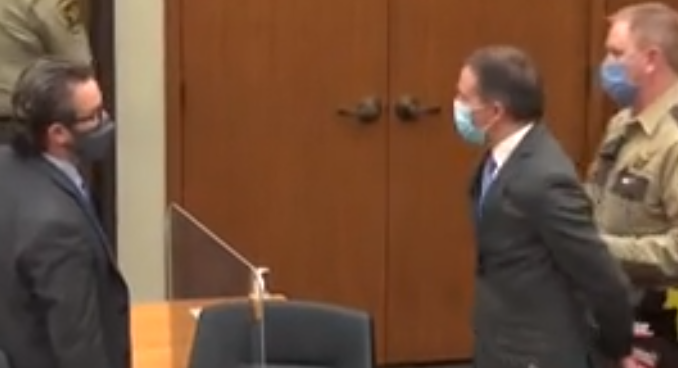
By Azhley Rodriguez and Chelsea Zhao
Dominican University moves forward with a diversity plan following the verdict of the Derek Chauvin trial.
Students on campus agree the outcome of the trial is justified but see systematic change as a necessity.
“I think that they’re rightfully addressed and he got convicted rightfully,” KJ Redfield said.
“I don’t see it as justice just because I think justice starts when there’s actually change in the system about changing things like police brutality and reforming it in some way: a reform in the government that will uplift and support black communities, so I think that’s more of my stance on it: I think It’s accountability but not justice,” Osvaldo Alvarez said.
In an email addressing the university, Chief Diversity Officer, Precious Porras said, “The Dominican community, in the spirit of the Sinsinawa Dominican Sisters, holds the George Floyd family in our thoughts and prayers following yesterday’s verdict in the Derek Chauvin trial.”
She mentions that although this verdict is a step in the right direction to change a justice system that falls short in accountability, grief will continue to be a driving force to make important policy changes.
“Our community will continue to transform grief and loss into action for concrete and substantive policy changes — in our own institution as well as in society,” Porras said.
Following her statement, she announced a diversity plan she will be curating in the coming months.
“I am developing a strategic diversity plan that looks at ways the Dominican community can implement the systemic, sustainable change essential for an inclusive community,” Porras said.
To provide options for student support, Porras adds Dominican’s involvement with Truth, Racial Healing & Transformation (TRHT) and offers Racial Healing and Affinity Circles for students seeking support.
“These circles provide safe spaces where listening, openness, and confidentiality are valued,” Porras said.
Students interested in participating in the Racial Healing and Affinity Circles can register on EngageDU.
Most of the students interviewed were not aware of the new diversity plan. However, students emphasized the importance of supporting all minorities.
“I know they do a really good job with the Hispanic community, I haven’t seen too much with any Asian pride,” Redfield said. “They try to do stuff with black community but it’s just walks and stuff, nothing really big. Other than that, I would say that Dominican’s doing alright. There’s always room for improvement.”
“I think that [the diversity plan] is a really good idea, especially since most Dominican — I’m Hispanic— the majority of Dominican is Hispanic as well,” Alvarez said. “So I feel inclusive in a lot of the communities but I know a lot of parts of Dominican communities are smaller, like Asian or the Black community are smaller groups. And I think them receiving more support would be a good thing.”
He also mentioned that the Black Student Union often had to rely on other organizations for funding, an issue that can be properly addressed in the future.
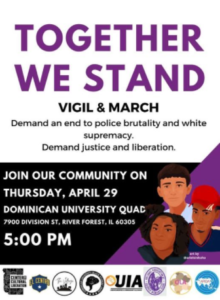 On Thursday April 29, a vigil and march against police brutality and white supremacy will be held in the university quad. The event is supported and hosted by student offices: Center for Cultural Liberation and El Centro as well as student organizations: the Village, Black Student Union (BSU), UIA, NACWC, OLA and APIDA.
On Thursday April 29, a vigil and march against police brutality and white supremacy will be held in the university quad. The event is supported and hosted by student offices: Center for Cultural Liberation and El Centro as well as student organizations: the Village, Black Student Union (BSU), UIA, NACWC, OLA and APIDA.
Chauvin, the Minneapolis police officer who killed George Floyd, was found guilty of unintentional second-degree murder, third-degree murder and second-degree manslaughter. The sentencing is expected in eight weeks.
“This is one victory within the justice system that needs to keep stacking to end systemic oppression,” Redfield said.
Unintentional second-degree murder means causing death without intending to while committing a felony offense. The maximum sentence is 40 years.
Third-degree murder means causing death to an individual without regard for human life, but without intending to cause death. The maximum sentence is 25 years.
Second-degree manslaughter means consciously causing death or bodily harm to another person. The maximum sentence is 10 years.
The prosecutor Steve Schleicher argued that Floyd’s death was the direct result of Chauvin kneeling on Floyd’s neck. Floyd died of cardiopulmonary arrest from the low oxygen level that led to brain injury and arrhythmia.
Hennepin County’s medical examiner, Dr. Andrew Baker, also testified Floyd’s death as “homicide.”
Minneapolis Police Department Chief Medaria Arradondo and other department members testified Chauvin’s unreasonable actions that violated the department policies.
Defense attorney Eric Nelson framed Chauvin’s action as reasonable under stressful circumstances and disputed Baker’s claim of homicide. He questioned Dr. David Fowler who testified opioids, methamphetamine and carbon monoxide poisoning possibly led to Floyd’s cardiac arrest.
a2rodriguez@my.dom.edu
qzhao@my.dom.edu
photo from USA today

